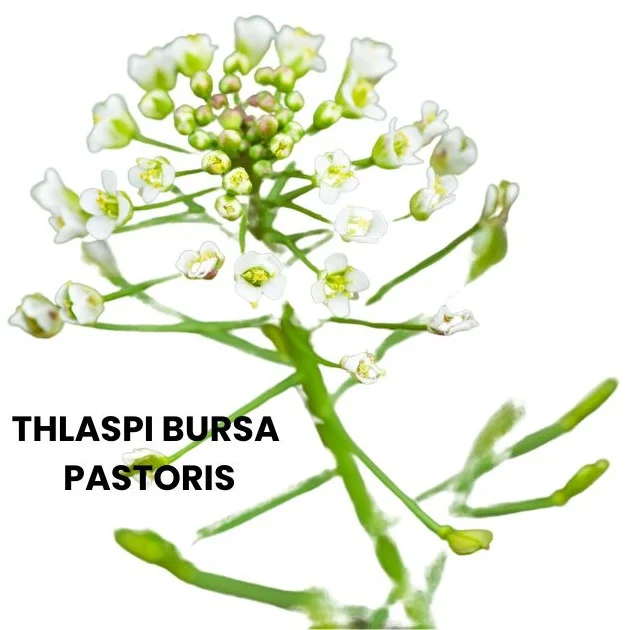Thlaspi Bursa Pastoris, commonly known as Shepherd’s Purse, is a well-known homeopathic remedy primarily used for its anti-hemorrhagic properties.
It is especially effective in treating conditions related to excessive bleeding (haemorrhage), kidney and bladder irritation, and issues associated with the urinary and female reproductive systems.
This remedy is also indicated for conditions involving uric acid buildup, such as albuminuria (excess protein in the urine) during pregnancy.

SOURCE INFORMATION
Scientific Classification
- Family: Brassicaceae (mustard family)
- Botanical Name: Capsella bursa-pastoris
- Common Name: Shepherd’s Purse
Origin
- Native to Europe, Shepherd’s Purse is now found in many parts of the world.
- Historically, it was used in traditional medicine for controlling bleeding and treating kidney disorders.
Historical Use
- Thlaspi Bursa Pastoris has been used for centuries in herbal medicine, particularly for its ability to stop bleeding.
- It earned its name “Shepherd’s Purse” due to the shape of its seed pods, which resemble small bags carried by shepherds in ancient times.
- Its homeopathic use focuses on female reproductive issues, especially haemorrhage, as well as urinary tract problems.
DRUG PATHOGENESIS
- The primary action of Thlaspi Bursa Pastoris centers around its ability to control excessive bleeding, particularly from the uterus and bladder.
- It also addresses conditions related to uric acid buildup in the body, leading to renal and bladder issues.
- In women, it is especially helpful for treating menstrual irregularities and uterine hemorrhages, often accompanied by pain and cramping.
KEY CHARACTERISTICS
- Anti-hemorrhagic: Primarily used to control and reduce excessive bleeding.
- Renal and Urinary Tract: Effective in treating conditions like cystitis (bladder inflammation), hematuria (blood in urine), and gravel accumulation in the kidneys.
- Menstrual Disorders: Known for its effectiveness in treating uterine hemorrhage and profuse menstrual bleeding.
- Albuminuria during Pregnancy: Addresses kidney irritation and excess protein in the urine during pregnancy.
DETAILED ORGAN SYMPTOMS
HEAD
- Puffy Eyes and Face: Often accompanied by swelling and frequent nosebleeds (epistaxis).
- Vertigo: Dizziness, particularly noticeable when rising from a seated or lying position.
- Frontal Headache: Pain in the forehead, worsening in the evening.
- Scaly Eruption: Eruption behind the ears with a white-coated tongue and cracked mouth/lips.
NOSE
- Bleeding During Nasal Operations: Useful in passive nasal hemorrhages, where the bleeding is slow and persistent.
MALE REPRODUCTIVE SYSTEM
- Sensitive Spermatic Cord: Discomfort or pain in the spermatic cord, particularly worsened by walking or riding.
FEMALE REPRODUCTIVE SYSTEM
- Metrorrhagia: Frequent and excessive menstrual bleeding, often accompanied by uterine cramps and expulsion of clots.
- Frequent Periods: Every alternate menstrual cycle may be very heavy.
- Leucorrhoea: Discharge before and after menstruation, which is bloody, dark, and offensive in odour, and may leave indelible stains.
- Uterine Pain: Soreness in the uterus, particularly when rising.
URINARY SYSTEM
- Frequent Urination: Frequent desire to urinate, with urine that is heavy and phosphatic (contains phosphate crystals).
- Chronic Cystitis: Bladder inflammation with difficulty urinating (dysuria) and spasmodic retention of urine.
- Renal Colic: Painful kidney stones, often accompanied by the presence of gravel or brick-dust sediment in the urine.
- Urethritis: Inflammation of the urethra, where the urine may escape in small jets.
- Replacement for Catheter: In some cases, this remedy may reduce the need for a catheter by improving urinary flow.
MODALITIES
- Worse: Symptoms worsen with rising, mental exertion, and in the evening.
- Better: Improvement is seen with warmth and rest.
WHAT ARE MODALITIES IN HOMOEOPATHY?
RELATIONSHIP WITH OTHER REMEDIES
Compare With:
- Urtica urens: Known for treating excessive bleeding.
- Crocus sativus: Useful in cases of dark, clotted hemorrhages.
- Trillium pendulum: Helps control excessive uterine bleeding.
- Millefolium: Also used for bleeding, particularly from the nose and uterus.
DOSE
- Thlaspi Bursa Pastoris is generally used in tincture form or in potencies ranging from the tincture up to the sixth potency.
- The specific dose and potency will depend on the individual’s condition and the severity of their symptoms.
Frequently Asked Questions
What is Thlaspi Bursa Pastoris used for in homeopathy?
- It is primarily used for controlling hemorrhages, especially uterine and urinary bleeding, as well as treating kidney and bladder issues, including cystitis and renal colic.
Can Thlaspi Bursa Pastoris help with menstrual problems?
- Yes, it is highly effective in treating heavy menstrual periods, uterine haemorrhage, and related cramps.
How does Thlaspi Bursa Pastoris affect the urinary system?
- It can alleviate frequent urination, kidney stones, and bladder irritation, and may even help avoid the need for catheterization in some cases.
How is Thlaspi Bursa Pastoris taken?
- It is typically taken in tincture or low potencies (up to sixth potency), as recommended by a homeopathic practitioner.
Glossary of Difficult Words
- Anti-hemorrhagic: A substance that stops or reduces bleeding.
- Albuminuria: The presence of protein (albumin) in the urine, often a sign of kidney disease.
- Metrorrhagia: Abnormal uterine bleeding, often outside of the regular menstrual cycle.
- Leucorrhoea: A white or yellowish vaginal discharge, often due to infection or hormonal changes.
- Dysuria: Painful or difficult urination.
- Haematuria: Blood in the urine.
- Renal Colic: Severe pain caused by kidney stones.
- Phosphatic: Referring to the presence of phosphate crystals in the urine.
